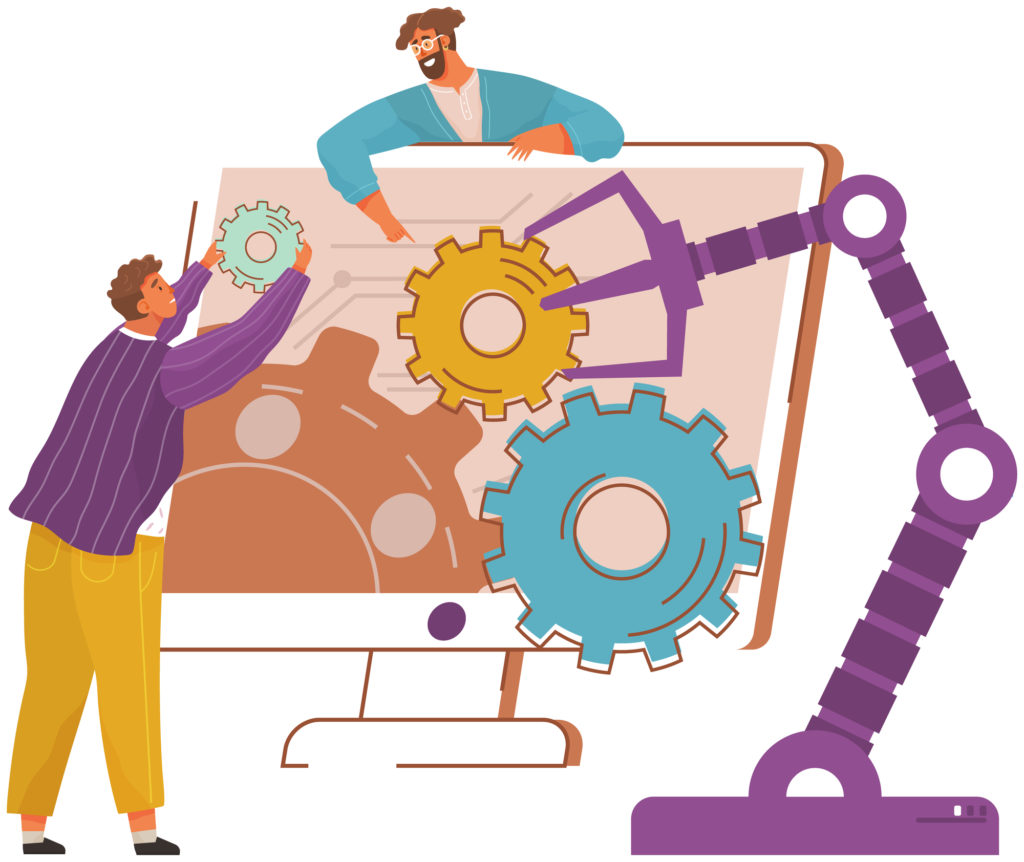 Intelligent automation is already a powerful force in our everyday lives. Computers remember our passwords, phones are starting to use facial recognition, and social media apps adjust their algorithms based on our activity. With many people working from home or quitting in the Great Resignation, robotic process automations (RPAs) are more relevant in the workplace than ever. RPAs won’t solve the labor crisis, but they can pick up the slack of the lost workers and help the employees who remain.
Intelligent automation is already a powerful force in our everyday lives. Computers remember our passwords, phones are starting to use facial recognition, and social media apps adjust their algorithms based on our activity. With many people working from home or quitting in the Great Resignation, robotic process automations (RPAs) are more relevant in the workplace than ever. RPAs won’t solve the labor crisis, but they can pick up the slack of the lost workers and help the employees who remain.
Here are five major ways intelligent automation will benefit your employees.
1. Increases Employee Productivity
A lot of time, energy, and resources get wasted in the average workplace. American businesses waste $650 billion a year on repetitive tasks. This waste largely results from human error, inconsistent work habits, and outdated technology. Automation addresses those deficiencies.
Devices with built-in artificial intelligence (AI) can replace human workers in completing dull and mundane tasks, freeing up time and labor for other, more important jobs. Auto manufacturer Volkswagen is one successful example of automation increasing productivity. The company added intelligent robotics to its assembly lines to help workers with physically challenging tasks.
Cloud-based software, another digital tool with automated features, also allows for easier employee communication and collaboration. Workers can collect and share data in real-time, helping them make more informed decisions.
2. Improves Workplace Satisfaction
Another problem with people doing the same redundant tasks is low workplace satisfaction. Employees feel frustrated and unappreciated when assigned these tasks. They know their talents and they know they could be doing something more productive. With labor shortages plaguing every industry, business owners and managers can’t afford to lose any more people.
When intelligent automation takes over the workplace’s most tedious jobs, employees feel less stressed and more appreciated. Their workloads are more balanced and make better use of their talents and experience. People also have more time to build workplace relationships and advance their careers.
3. Enables Faster Growth
The main reasons for the Great Resignation are low pay and minimal satisfaction. Companies that implement automated tools to improve employee engagement can regrow their workforces to pre-pandemic levels. The money saved from automating mundane tasks also allows businesses to pay their workers better wages, giving them another reason to stay.
The initial expenses for intelligent automation might tighten a company’s budget. However, the long-term returns can take the company to new heights. Content, well-paid employees will perform better at their jobs, increasing revenue and allowing for more high-tech investments in the process.
4. Helps New Employees Adapt
The onboarding process is crucial for employee retention, as 33% of workers quit their jobs within the first 90 days. Automation can help people adapt to their new jobs more quickly by analyzing their activity and determining their strengths and weaknesses. Managers and supervisors can then use this information to put new hires in the best positions to succeed.
Automation also keeps employees in the loop and tracks their progress. An automated communication tool might send recurring emails, schedule meetings, and set milestones. Consistent human interaction is crucial for new faces to feel welcomed, and automation makes sure no one’s needs are neglected.
Additionally, it brings new hires up to speed on the company’s compliance with industry-specific regulations. Adjusting to unfamiliar rules and policies is one of the most challenging parts of starting a new job. Task automation helps companies adhere to their industry standards by cutting out human error, while also helping new workers learn the rules more quickly.
5. Builds a Strong Brand Identity
Better productivity, satisfaction, and growth are all huge benefits, but there’s still one more. Perhaps the most important effect of adding intelligent automation is a stronger brand identity. Today’s workforce – especially younger people – look for a higher purpose in their jobs more than anything else. A strong brand identity is crucial for giving its employees purpose.
People want to work for a brand with a strong workplace culture and a positive public image. Intelligent automation can’t build a brand identity by itself, but it can help managers create more productive work environments. While automation takes care of the boring stuff, employees can focus more on promoting the company’s values and becoming a tight-knit team.
Intelligent Automation Can Reshape the Modern Workplace
Low productivity and satisfaction were problems throughout the workforce well before 2020. The pandemic only highlighted these problems and forced companies to acknowledge them. The modern workplace needs a major shake-up to end the Great Resignation and get the economy buzzing again. Intelligent automation might be the tool we’re looking for.


